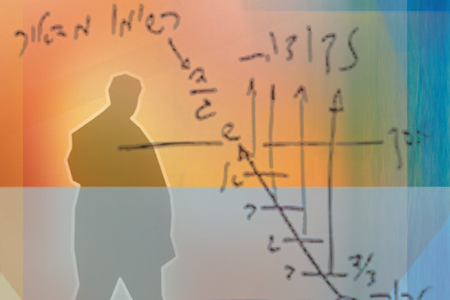
Every single act we perform in life is born out of a desire. From the smallest, most insignificant, conscious act to acts that require a vast amount of energy, they are all performed for one single reason: a desire entered us and affected us enough for us to take an action to fulfill it. Kabbalah calls the force that propels us to fulfill these desires “the will to receive.”
We are completely controlled by desire; without one, we remain perfectly still, not moving as much as an inch. But what is the goal? What are we trying to achieve by consciously and subconsciously following our desires? The answer is pleasure. We pursue them in order to receive pleasure in one form or another.
This will to receive is so complex and cunning that at best we barely even notice we are slaves to it. Of course, nobody in their right mind wishes to admit they are a slave to anything or anybody. But if a person takes time to seriously reflect why he or she performs any given action, even actions of the highest morality, there is only one conclusion that explains all acts. We act only in order to receive pleasure for ourselves…….period.
The will to receive pleasure is so powerful that it can even override instant gratification, such as safety or money, for a greater pleasure to be received in the future. At the end of the day, if we have any stake in an outcome, if we calculated ways to achieve this result, our will to receive made that decision.
Non-Stop Calculations about the Expected Pleasures
So what really happens with the will to receive and why does it cause such actions when a desire presents itself?
The answer is simple—a judgment is made.
A calculation occurs regarding the pleasure an act may bring versus alternative actions and the pleasure they may bring. This calculation happens at lightning speed and does not usually require conscious thought.
What ingenious tool has such a capability to perform these calculations and do it literally millions of times a day?
The answer lies right between our ears: that marvel of a biological computer we refer to as the brain.
The will to receive is so perfectly developed within us that it boggles the mind to consider how many acts it controls every single second. Every function of your body operates through this environment. All systems act in a coordinated manner to insure the utmost efficiency for a person’s bare survival on an unconscious level; all the while calculations that require conscious cognitive processing occur simultaneously.
The calculation with regard to when or whether to perform an action at all is a calculation of work. That is the fundamental formula within the brain: possible pleasure received versus work required to receive the pleasure. If we are sick as a dog lying in bed at night sleeping and the phone rings, we probably will not get out of bed to answer it. But if the house is on fire and we smell smoke, we can literally be on our death beds, but we will get out of that house somehow. The brain prioritizes. It matches, compares, estimates and makes the decision based upon the results of the analysis. Once the decision has been made, only then is there an action.
Different Methods of Receiving Pleasure
In the case of desires like the thirst for water, it is easy to see how the will to receive works. The confusion comes when we begin to consider acts where a person is seemingly giving to others, like people who support charities, or Boy Scouts who help old ladies cross the street. The answer is that there are actually two types of receiving for oneself.
The first is the simplest: the will to receive in order to receive. The second is the will to give in order to receive. As previously mentioned, the will to receive is exceptionally cunning. Not only can it work out ways to receive by simply getting for itself, it can even work out ways to receive by giving to others.
On the surface, this makes absolutely no sense. What possible pleasure could one receive by giving? Of course, anyone who has ever been to a birthday party, brought a gift to a friend, and laid it upon the table with the rest of the gifts is well aware how they simply cannot wait for their friend to open the particular gift they had brought. In fact, it is of utter most importance that the gift they brought is enjoyed by the birthday honoree.
Some people have discovered just how pleasurable this type of receiving can be and literally give millions of dollars to charities all over the world. It is not that they necessarily like dispensing their hard- earned money; it is simply that they receive a pleasure that is greater by doing so than by keeping it and spending it on themselves. In fact, some people are so addicted to this type of pleasure that, if you were to somehow stop them from continuing to do so, they would no longer consider life worth living.
Animal, and Social Desires
People receive their desires from two distinct places. First, there are the animal desires, which are the same as those of any other biological animal. These desires for food, rest, shelter, and procreation are received genetically and are apparent no matter whether one lives within society or not.
Then society takes over. There are desires such as money, honor, knowledge, and power that we depend upon society to provide.
Everybody wants to feel good about themselves, and if left totally alone, this does not take much effort. Yet this is where the society really begins to come into play. How? Our opinion regarding our self-worth is drastically influenced by how we are regarded by the society we live in.
If our immediate environment dictates that it’s important to have a certain type of car, you will see garages full of them. If it is a certain hairstyle, every woman will be wearing it. If hunting is what determines one’s manliness in the area, hunting will be a popular sport. In other words, our society provides us with what it deems important in these areas.
Of course, we do have some freedom of choice. Our current fashions will offer a variety of colors and shapes, the latest type of car will come in different models by different companies, and we have a wide array of choices for that college degree. But even in these, our choices are based on desire, what we perceive will give us the most pleasure.
To summarize, every action we make is predetermined by the de- sires within each and every one of us. We receive those desires from two different sources: our genetics and our environment. We are pressured one way or the other to fulfill what we calculate will bring us the most pleasure based upon those desires we receive. To go against these pressures is virtually impossible.
 “Desire – the Fuel that Drives Us” is based on the book, Wondrous Wisdom: Everyone’s Guide to the Study of Authentic Kabbalah by Michael R. Kellogg.
“Desire – the Fuel that Drives Us” is based on the book, Wondrous Wisdom: Everyone’s Guide to the Study of Authentic Kabbalah by Michael R. Kellogg.
